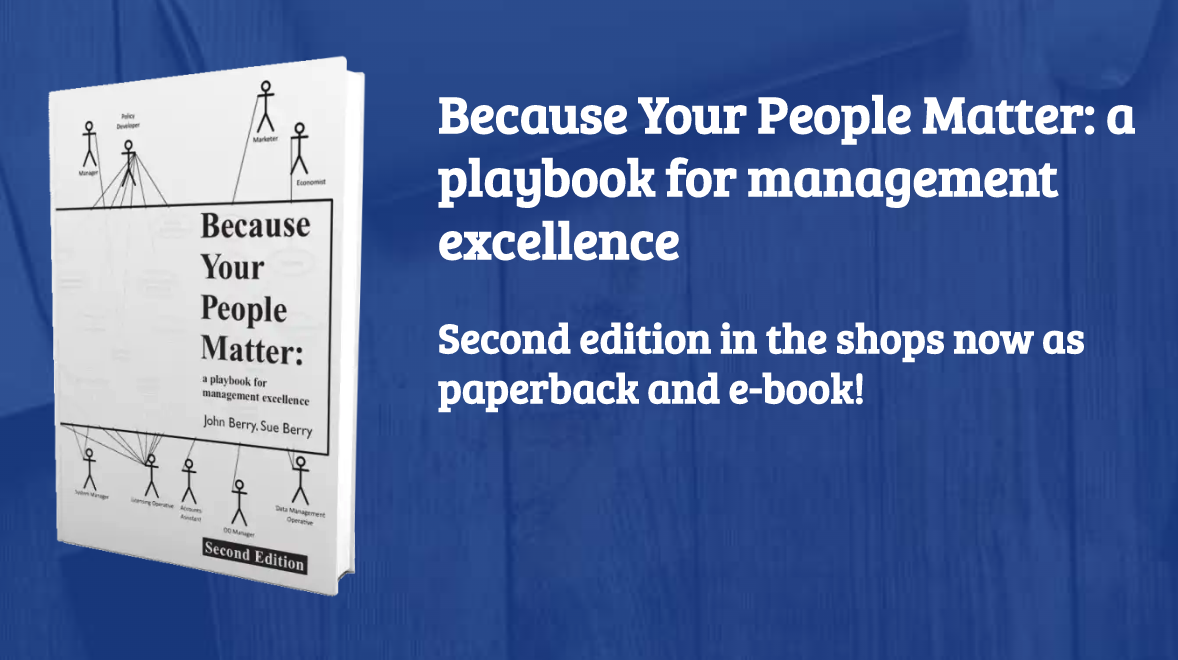One of many articles on management
Director of Happiness is a sham of a job
Written by John Berry on 1st March 2022. Revised 17th June 2022.
5 min read
 Back in the day when running a lab in Philips with 20 electronic, software and mechanical engineers, I met with my manager weekly to review programmes and discuss issues. Those meetings were wide-ranging. We discussed spend against budget and progress against plans, and we discussed more esoteric, touchy-feely things like people, their wellbeing, and their development.
Back in the day when running a lab in Philips with 20 electronic, software and mechanical engineers, I met with my manager weekly to review programmes and discuss issues. Those meetings were wide-ranging. We discussed spend against budget and progress against plans, and we discussed more esoteric, touchy-feely things like people, their wellbeing, and their development.
And I met with my section leaders and principal engineers weekly. Thinking about successes and issues, wellbeing, careers, and gripes and moans was a key part of my job – alongside the plans, budgets, technical reviews, and discussions with my peer managers across the road in the factory.
But now all the functions that I did are consigned to history. Modern managers, entrepreneurs, leaders, and the like don’t manage.
Amelia Hill, writing in The Guardian, tells of how a Timpson’s employee had a meltdown when her oven broke, compounding existing personal issues. Colleagues told the Director of Happiness, and she bought her a new one. The employee said, “Having a director of happiness makes a massive difference to every minute of my working life”.
Really? Seriously?
The Timpson’s Director of Happiness is quoted as saying, “If people feel supported and cared for, they are calm, relaxed and hardworking.”
So that’s where I’ve been going wrong over the past 40 years. I should have made the case to my manager for a new £50k head to arrange purchase of cookers, organising micro-retreats for staff and send them books by their favourite authors. According to the article, it just wasn’t my job to know how my people were feeling, and make sure that they were both committed to the firm and engaged with the job – it was someone else’s all along!
The Guardian article suggests that to make a firm a vibrant place to work, we need one of these new gods to conduct “a monthly, hour-long mental health “walk-and-talk” with every member of the company”. Was than not what I did with Peter (or Chris, or Cyprien, or Sarah or…) as we walked and chatted on the way to Tesco’s for a sandwich. Was than not what I did with Jan on the flight to Oman? Or with Lee and his team in an Oslo restaurant after the customer review?
This article is really beyond the pale. The author – and the people cited - need to read it again and think what they are saying. The senior managers from the firms cited need to think hard about the meaning of management. And the CMI as sponsor of such a job needs to engage its collective brain and think how it wants to portray the role of HR and management.
The fundamental issue under discussion here is the roles of UK managers and their associated necessary competence.
It’s a government statistic that less than 20% of UK managers are trained for the job. So, in a sense it’s no surprise that managers sub-contract all manner of roles that traditionally and necessarily would be part of ‘management’ if they don’t have the skills and knowledge to do them. It’s no surprise that managers sub-contract ‘happiness’.
The job of Happiness Officer is a non-job. Let me explain.
 Management is fundamentally about intervention – intervention in an employee’s life so that the employee will do what the manager wants. Intervention requires the manager to understand the employee and to choose the right intervention for the moment. If the employee is having a meltdown and needs an oven, it’s perhaps clear how the manager can influence that person with a quick call to AO.com. I joke here, of course. Managers should understand their people and it shouldn’t take an oven to recover their commitment and ‘happiness’.
Management is fundamentally about intervention – intervention in an employee’s life so that the employee will do what the manager wants. Intervention requires the manager to understand the employee and to choose the right intervention for the moment. If the employee is having a meltdown and needs an oven, it’s perhaps clear how the manager can influence that person with a quick call to AO.com. I joke here, of course. Managers should understand their people and it shouldn’t take an oven to recover their commitment and ‘happiness’.
Continuous ubiquitous everyday intervention, giving and receiving, builds trust between manager and employee. This giving and receiving can be on a minute scale – just a smile in return for acknowledgement of good work. Or it can be more tangible, like a development opportunity given in return for flexibility and unsaid expectation of future behaviour.
But the manager must a) understand what’s needed and b) have the executive authority to act. And authority is not the ability to use a company credit card to send a £9.99 novel to the employee’s home! It’s the authority to restructure a group, discuss new jobs with group members, set up training and make a change happen. That needs a manager, not a Director of Happiness.
There’s an interesting quote on the BBC a few years ago from General Sir Nick Houghton, then Chief of Defence Staff, who in discussing morale and performance, says:
“It’s not about individual happiness. I couldn’t say that everyone in the British Army is happy on a given day. It’s about the ability to perform… and continue to perform in times of pressure.”
Ensuring that employees perform every day requires them to be doing a job that they love, in a firm that they admire, for a manager they respect and trust. It requires them to be motivated, in all that this demands, including providing them with the right tools, good leadership and an appropriate culture. And it requires that, right up front in recruitment, the right person has been selected for the right job.
All of this is the manager’s bailiwick – sub-contracting bits of it will not work. And specifically, trust cannot be sub-contracted. Trust is a personal thing between manager and employee that can't be mediated by a third party.
A Director of Happiness does not have the executive authority to make what’s needed happen every day. Such a job is a sham. It’s an invention to avoid the hard work of learning and getting good at management.